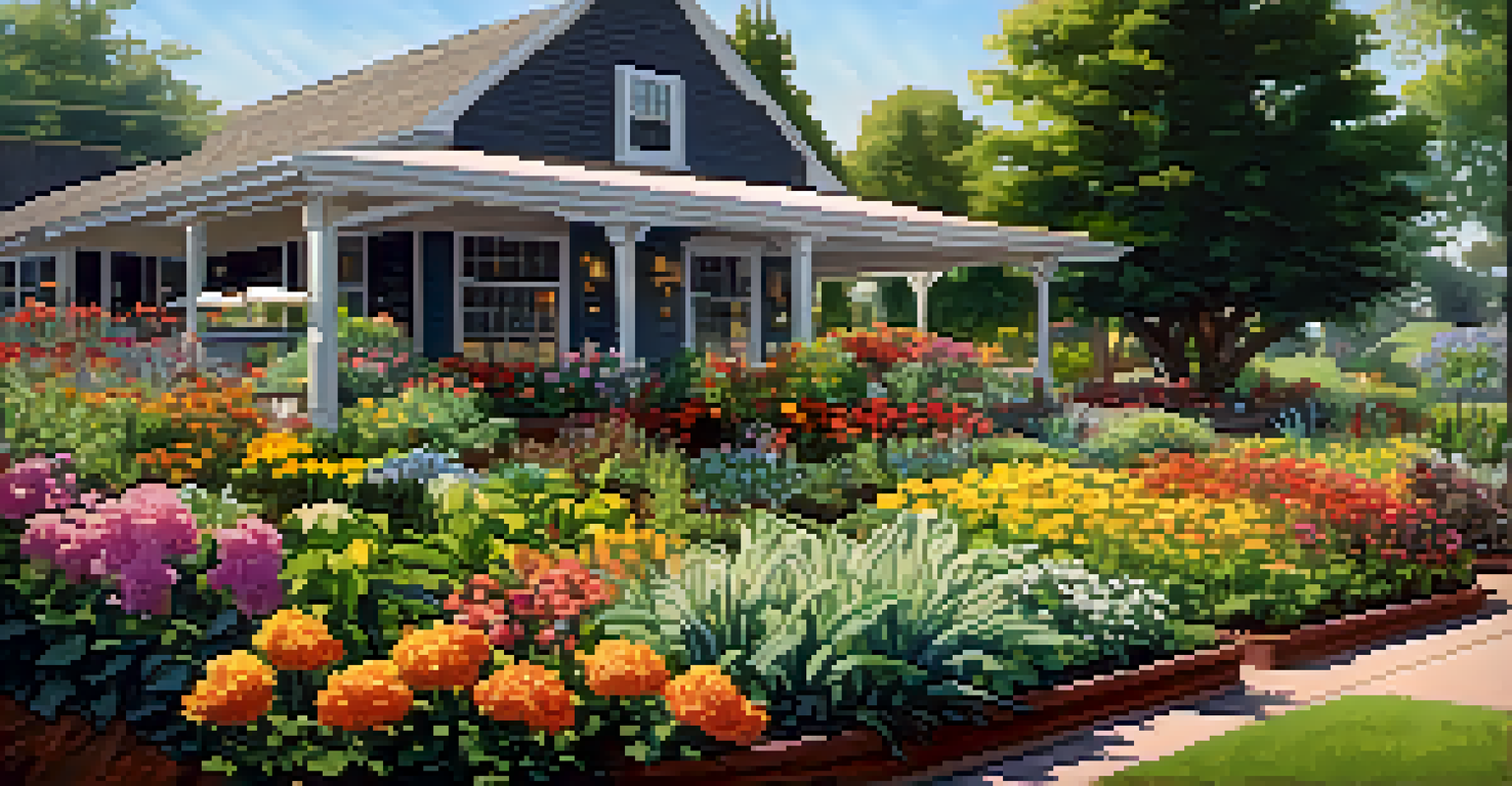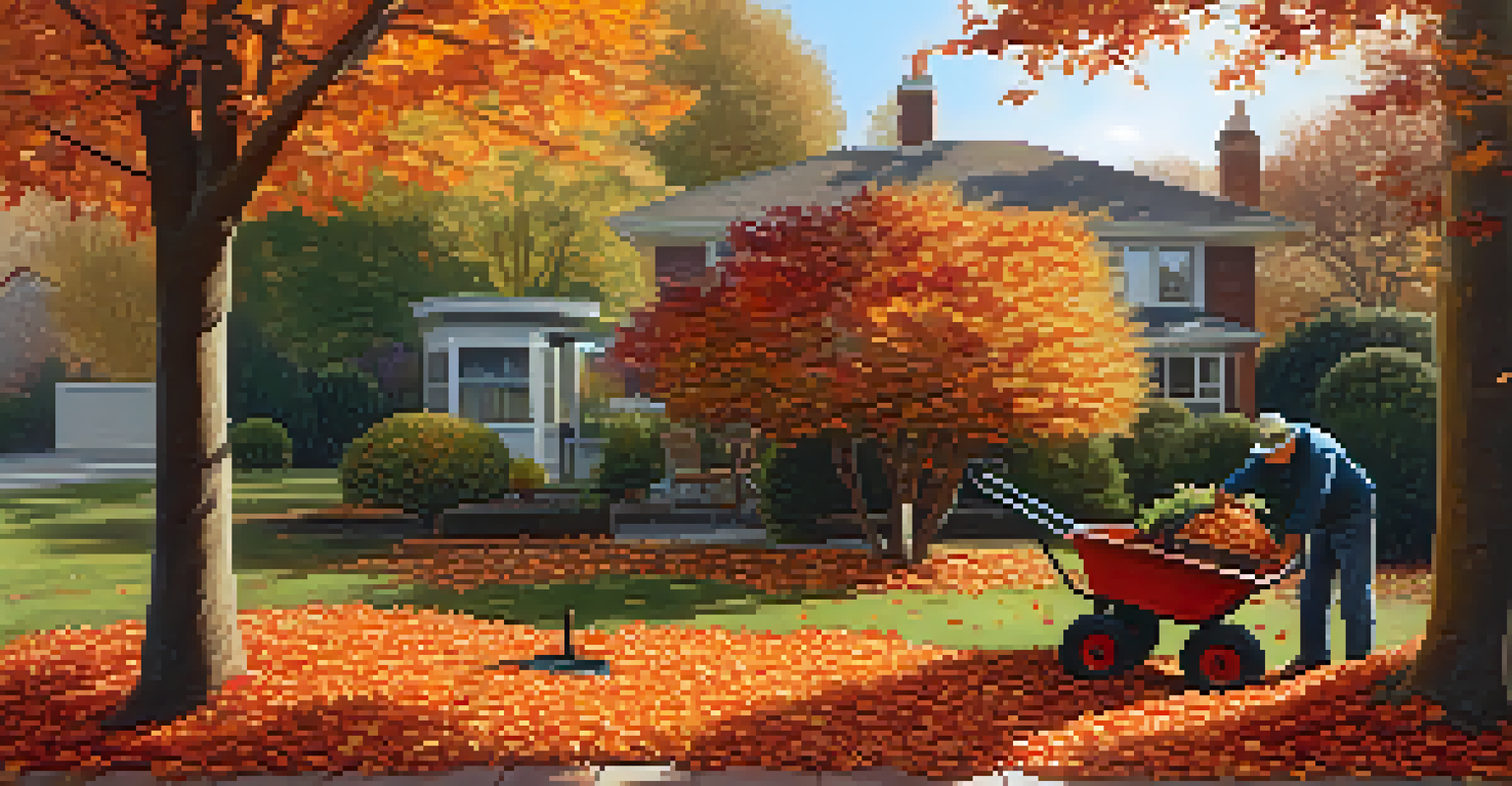Garden and Landscape Maintenance: Seasonal Checklist Guide

Spring: Revitalize Your Garden and Landscape
As the chill of winter fades, spring is the perfect time to breathe new life into your garden. Start by cleaning up any debris left over from the colder months, like dead leaves and branches. This not only improves aesthetics but also promotes healthy growth by allowing sunlight to reach the soil.
To plant a garden is to believe in tomorrow.
Next, consider fertilizing your plants to give them the nutrients they need to thrive. Using an organic fertilizer can enhance soil health and support vibrant blooms. Don’t forget to prune any dead or overgrown branches to encourage new growth and maintain a tidy appearance.
Finally, this is the ideal season to plan and plant your summer garden. Whether you’re adding colorful flowers or fresh vegetables, the possibilities are vast. Take a moment to sketch out your garden layout and choose plants that suit your space and climate.
Summer: Maintain and Enjoy Your Lush Landscape
Summer is all about enjoying the fruits of your labor, but it’s essential to keep your garden flourishing. Regular watering is crucial during this hot season; consider setting up a drip irrigation system for efficiency. This helps ensure your plants receive consistent moisture, especially during dry spells.

Weeding is another important task; those pesky intruders can compete with your plants for nutrients. Spend some time each week pulling them out to keep your garden looking neat and healthy. Mulching around your plants can also help suppress weeds and retain soil moisture.
Seasonal Gardening Tasks
Each season requires specific tasks to maintain a healthy and vibrant garden.
Lastly, don’t forget to deadhead flowers to encourage more blooms and maintain the beauty of your landscape. Regularly checking for pests and diseases is also vital to protect your garden. Staying vigilant will help you catch any issues early, ensuring a vibrant and thriving outdoor space.
Fall: Prepare for Winter's Embrace
As the leaves begin to change and fall sets in, it’s time to prepare your garden for the colder months. Start by raking fallen leaves, which can be composted or used as mulch. This not only tidies up your space but also enriches the soil when broken down.
The greatest gift of the garden is the restoration of the five senses.
Next, consider planting fall bulbs for a beautiful spring display. Tulips, daffodils, and hyacinths are great choices that will bloom when the weather warms up. Just remember to plant them at the right depth to ensure they thrive come spring.
Finally, protect your existing plants with mulch or frost blankets. This insulation helps regulate soil temperature and protects roots from freezing. Taking these steps now will set your garden up for success when spring returns.
Winter: Care for Your Landscape and Plans Ahead
Winter doesn’t mean your landscape maintenance should come to a halt. It’s a great time to evaluate your garden and plan for the upcoming seasons. Take notes on what worked well and what didn’t, so you can make informed decisions for your next planting cycle.
If you live in a snowy area, ensure that heavy snow doesn’t accumulate on your evergreen trees. Gently brush off excess snow to prevent branch breakage. This simple step can help your trees stay healthy and beautiful come spring.
Seasonal Tasks for Garden Success
Each season requires specific maintenance tasks, from spring cleaning to fall preparation, to ensure a thriving garden.
Additionally, consider using this time to research new plants or gardening techniques. Winter is a perfect opportunity to read gardening books or even attend local workshops. By broadening your knowledge, you can enhance your skills and prepare for a successful gardening year ahead.
Regular Tasks: Essential Year-Round Maintenance
While each season has its specific tasks, there are essential maintenance activities that should be done year-round. Regularly checking for pests and diseases is crucial; early detection can save your plants from serious damage. Keeping a close eye on your garden will help you catch any issues before they escalate.
Another important task is maintaining your garden tools. Clean and sharpen them after each use to ensure they remain effective and safe. A well-maintained tool can make all the difference in your gardening experience, making tasks easier and more efficient.
Moreover, consider creating a garden journal to track your progress throughout the year. Documenting your planting dates, growth patterns, and weather conditions can provide valuable insights for future gardening endeavors. This personal touch can help you become a more informed and successful gardener.
Soil Health: The Foundation of Your Landscape
Your garden's success starts with healthy soil. Regular soil testing can help you understand its pH and nutrient levels, allowing you to make amendments as needed. Healthy soil promotes strong root systems and vibrant plant growth, so don’t overlook this crucial step.
To improve soil quality, consider adding organic matter such as compost or well-rotted manure. These materials enrich the soil, enhance drainage, and provide essential nutrients for your plants. Plus, they help create a thriving ecosystem in your garden.
Soil Health is Crucial
Healthy soil is the foundation for strong plants and vibrant growth, making regular soil care essential.
Mulching is another effective way to protect your soil. A layer of organic mulch can suppress weeds, retain moisture, and improve soil structure as it breaks down. By prioritizing soil health, you’re investing in the long-term success of your garden.
Sustainable Practices: Eco-Friendly Gardening Tips
In today’s world, incorporating sustainable practices into your garden maintenance is more important than ever. Start by choosing native plants that require less water and are naturally resistant to local pests. This not only conserves resources but also supports local wildlife.
Composting is another excellent way to reduce waste and enrich your garden. Instead of throwing away kitchen scraps and yard waste, create a compost pile to recycle those materials. Composting not only benefits your garden but also helps reduce landfill waste.

Lastly, consider using natural pest control methods. Instead of reaching for chemical pesticides, try introducing beneficial insects like ladybugs or using neem oil. These eco-friendly options can help keep your garden healthy without harming the environment.